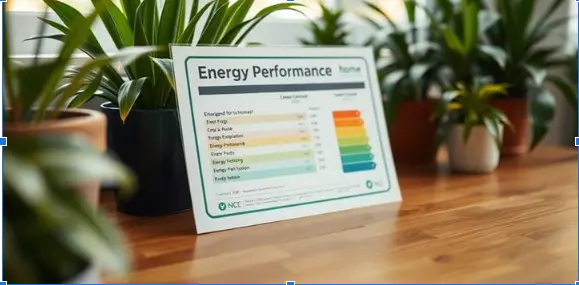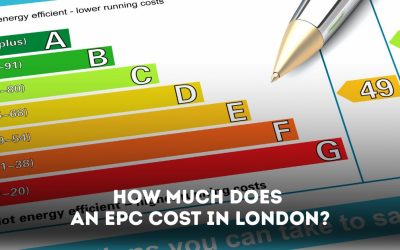Rosie watched anxiously as the assessor inspected her home’s ancient boiler and single-glazed windows, wondering what the Energy Performance Certificate would reveal. “What does an energy performance certificate involve exactly?” she asked, concerned about the rating that might affect her London property’s rental prospects.
The assessor explained that the certificate examines heating systems, insulation quality, and energy-efficient features, all contributing to the final A-G rating. For property owners in England and Wales, understanding what an energy performance certificate involves can mean the difference between a smooth transaction and costly delays or improvements.
Key Points
- An EPC is required for selling or renting properties in the UK.
- The assessment evaluates factors like insulation levels, heating systems, and power usage.
- EPC ratings range from A (most efficient) to G (least efficient).
- Efficiency recommendations can lead to lower utility bills.
- Finding a qualified, accredited domestic assessor is crucial for obtaining a valid EPC in London.
What Is an Energy Performance Certificate (EPC) in the UK?
What does an energy performance certificate involve? An Energy Performance Certificate, or EPC, is basically a report card for your property’s efficiency. It tells you how efficient your home is and what its carbon emissions impact is on the environment. Think of it as a nutritional label, but for your house.
It’s a legal requirement when selling or renting a property in the UK, and it gives prospective buyers or tenants a clear picture of what to expect in terms of utility costs. It’s all about understanding domestic assessments in London and beyond with Moffat Electricals.
Importance of EPC in Property Transactions
Certificates aren’t just a formality; they play a significant role in property transactions. A higher EPC rating can make your property’s rating more attractive to buyers or landlords, potentially increasing its property value. Conversely, a poor rating may deter some people or lead to lower offers.
The importance of efficiency certificates can’t be overstated. Plus, the certificate also gives recommendations to improve home efficiency, helping you reduce utility bills and carbon emissions. It’s a win-win for homes in England and Wales!
How Long Is an EPC Valid
Certificates are valid for ten years from the date of issue. If you’re looking to sell or rent and you already have an EPC that’s less than 10 years old, you don’t need a new certificate.
However, if your certificate is about to expire or if you’ve made significant home efficiency improvements to your home, it might be worth getting a new EPC to reflect those changes. Learn more about how long an EPC lasts to understand validity details. Knowing how to get an energy performance certificate via the EPC Register is the first step.
What Do EPC Assessors Check During a Property Inspection
During an EPC assessment, a qualified professional thoroughly inspects your property to evaluate its energy performance. This involves checking key areas such as
- Property Basics: Size, number of bedrooms, and type of building (house, flat, etc.).
- Heating System: Type and efficiency of your boiler or other heating.
- Insulation: Levels in walls (cavity), loft, and any other areas.
- Windows and Glazing: Whether you have double, triple, or single glazing.
- Ventilation: The type of ventilation systems in place.
- Lighting: The efficiency of the light bulbs used throughout the property.
This detailed inspection allows the assessor to understand how energy is used and retained within your UK property, ultimately determining its EPC rating.
How EPC Data is Collected
To gather the necessary information for your EPC survey, the assessor will need access to all areas of your property. The process begins with a visual inspection, where the accredited domestic assessor measures rooms, notes the building type, and examines the boiler and insulation levels.
If you have documentation for energy-efficient upgrades like double or triple glazing, please have it available. The assessor will then input this data into RdSAP software, the standard tool for domestic EPC calculations. Finally, they will generate your EPC report, ensuring an accurate energy efficiency rating for your property.
Evaluating Energy Efficiency
Evaluating home efficiency is about determining how much power your property in the UK wastes. The accredited assessor uses the collected data and RdSAP software to calculate an efficiency rating.
This score determines your EPC rating from A (super efficient) to G (least efficient). Better insulation levels and heating systems lead to a higher rating. The certificate also includes tailored efficiency recommendations to minimize heat loss and reduce consumption.
A good EPC rating makes your property’s efficiency more attractive and can lower utility bills. Think of it like this: the assessment is a checkup for your home, identifying areas to improve efficiency for your wallet and the environment with efficient light bulbs or renewable technologies.
The Role Of Domestic Energy Assessors
Qualifications Required
To become a domestic assessor, you must meet specific requirements for assessors. You can’t just decide to do it overnight. It involves completing a training course and getting certified by an accredited body.
These courses cover building type, heating systems, and how to assess property’s performance accurately. Becoming an accredited domestic assessor is achievable with dedication for getting a certificate in London.
Responsibilities During Assessment
What does a domestic assessor do during an assessment? Their main job is to conduct thorough checks on properties. The check involves inspecting the property size, insulation levels, heating system, and windows/glazing type.
They collect data via measurements and visual inspection, then use RdSAP software for data entry to calculate an efficiency rating. The assessor provides an unbiased report with recommended efficiency tips, helping homeowners understand their consumption.
Finding a Qualified Assessor in London
Finding a reliable, accredited assessor in London is key. You want someone who delivers a valid certificate without overcharging. Here are some tips:
- Check the EPC Register at gov.uk for accredited assessors.
- Ask for recommendations from estate agents or friends.
- Read reviews to gauge reliability.
Choosing a qualified domestic assessor ensures you receive an accurate EPC, which is crucial for meeting regulations like MEES and understanding potential for reducing energy costs.
For professional services, explore our Residential EPC for homes or Commercial EPC for businesses to ensure compliance and efficiency.
Interpreting EPC Ratings

Energy Performance Certificate on a table with plants, showing what an energy performance certificate involves for home efficiency.
Understanding The A-G Scale
Certificates use a simple EPC rating (A to G) scale to show a property’s efficiency. ‘A’ is the best, meaning super efficient, while ‘G’ is the least efficient. It’s like a report card for your home. showing how well it uses power. A higher rating means lower utility bills. The certificate also includes a quick way to understand EPC ratings at a glance in England & Wales.
Impact of EPC Ratings on Property Value
EPC ratings can affect your property value. Homes with better ratings are more attractive to buyers and landlords who want lower utility bills and reduced carbon emissions. Some lenders offer better mortgages for efficient homes. Improving your EPC rating via home improvements boosts property value in London. Whether you’re planning to sell or let, a strong EPC rating gives you a clear advantage
How EPC Ratings Affect Energy Costs
Your EPC rating indicates your utility costs. A higher rating means less consumption, translating to lower utility bills. An ‘A’-rated home is like a fuel-efficient car, while a ‘G’ is a gas guzzler. The rating may lead to significant power savings, especially with efficiency improvements. Here’s a table showing the impact of EPC ratings on utility costs:
| EPC Rating | Potential
Utility Costs |
| A | Very Low |
| C | Moderate |
| G | Very High |
Factors influencing your score include insulation levels, heating system efficiency, window/glazing type, and renewable sources like solar panels.
Energy Efficiency Recommendations

Modern eco-friendly house with rooftop solar panels, large glass windows, greenery, and high EPC rating for energy efficiency.
Common Recommendations for Improvement
Your report doesn’t just show your EPC rating; it provides energy efficiency recommendations tailored to your property in the UK. Common suggestions include
- Insulation upgrades: Adding cavity wall insulation or loft insulation reduces reliance on heating systems.
- Boiler replacement: Upgrading to a high-efficiency boiler cuts consumption.
- Double- or triple-glazed windows: These reduce heat loss significantly.
- Efficient lighting: Switching to efficient light bulbs like LEDs lowers power usage.
These recommended efficiency tips help improve your rating with renewable technologies like solar panels.
Potential Cost Savings
Improving your home’s efficiency is good for the planet and your wallet. The report estimates power savings from each recommendation. These can add up, especially in London with rising utility costs. A more efficient home is also more comfortable. Here’s a table of potential savings:
| Improvement | Estimated Annual Savings |
| Loft Insulation | $100–$300 |
| Cavity Wall Insulation | $150–$350 |
| Boiler Upgrade | $200–$500 |
| Double Glazing | $50–$150 |
Government Incentives for Energy Efficiency
The UK government offers incentives like grants and tax credits to encourage efficiency improvements. These offset costs for home improvements like cavity wall insulation or renewable sources like solar panels. Check out the latest energy efficiency tips for homeowners in London. Local authorities may also offer incentives, so research what’s available to meet minimum standards.
After The EPC Assessment
What To Expect After Assessment
After your assessment, the assessor compiles data via RdSAP software to generate your report. This takes a few days, as generating the report requires careful analysis. The cost for homeowners is a one-time fee, but understanding your property’s performance offers long-term power savings with Moffat Electricals. Curious about pricing? Check out How much does an EPC cost? for detailed insights.
Understanding Your Report
Your report includes:
- Property Information: Details, assessment date, and reference number.
- Efficiency Rating: Your EPC rating (A to G) and carbon emissions.
- Efficiency Recommendations: Tips to improve efficiency.
The certificate is a roadmap to reduce utility bills and enhance property value.
Next Steps for Property Owners
With your report, consider:
- Reviewing efficiency recommendations for cost-effective home improvements.
- Getting quotes for renewable technologies or cavity wall insulation.
- Planning upgrades, noting that a certificate lasts for 10 years.
These steps boost your property’s efficiency and meet minimum standards.
Legal Requirements For EPCs
EPC Requirements for Selling or Renting
When looking to sell or rent a property in the UK, providing a certificate is mandatory under the regulations. Landlords must provide a certificate to potential tenants before listing to show the efficiency of a property. Exceptions include listed buildings, but most homes in England and Wales need a certificate. Estate agents can arrange an EPC certificate if needed.
Penalties for Non-Compliance
Failing to provide a certificate can lead to fines from Trading Standards or local authorities. Penalties vary by property type but can be significant. MEES requires landlords to meet minimum standards (rating E or above). Non-compliance risks costly fines, so ensure your valid certificate is ready.
Exceptions to EPC Requirements
Some properties are exempt:
- Listed Buildings: If efficiency improvements harm their character.
- Temporary Buildings: Used for two years or less.
- Places of Worship: Typically exempt.
Check regulations with your local authority to confirm if your property in the UK needs a certificate.
Wrapping It Up: What Does an Energy Performance Certificate Involve?
What does an energy performance certificate involve? Getting a certificate is straightforward and helps you understand your property’s efficiency in London. The assessment looks at insulation levels, heating systems, and double- or triple-glazed windows, giving a rating from A to G.
The certificate also gives recommendations to improve your rating, helping reduce utility bills and carbon emissions. Whether you sell or rent, an energy certificate is a legal requirement worth having with Moffat Electricals.
Frequently Asked Questions
What is an Energy Performance Certificate (EPC)?
An Energy Performance Certificate shows how energy-efficient a property is. It gives a rating from A (most efficient) to G (least efficient) and includes estimated energy costs and carbon dioxide emissions.
Why do I need an EPC when selling or renting a property?
An EPC is legally required when you sell or rent out a property. It helps potential buyers or tenants understand the energy efficiency and expected utility bills.
How long does an EPC last?
An EPC is valid for 10 years. After it expires, you’ll need to get a new assessment to continue renting or selling the property.
What is included in an EPC assessment?
An accredited energy assessor will inspect the property’s insulation, heating system, windows, and glazing type to calculate the efficiency rating.
How can I improve my EPC rating?
To improve your EPC rating, you can install cavity wall insulation, upgrade to an energy-efficient boiler, use LED lighting, or improve loft insulation.
What happens after the EPC is completed?
You’ll receive a certificate that shows your property’s energy rating. It will also include energy-saving recommendations and details on your current power usage.





0 Comments